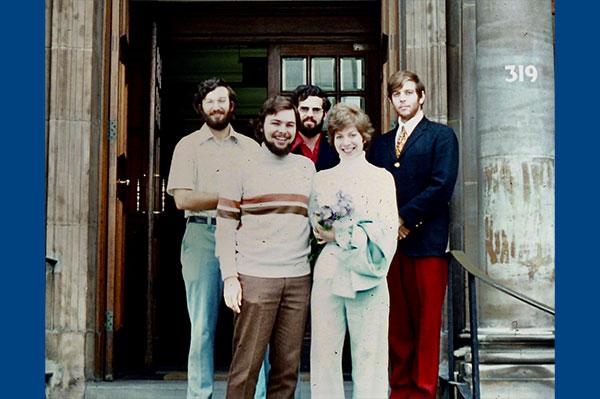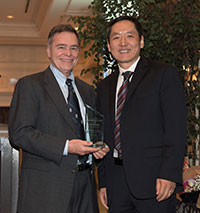Generosity is its Own Reward: Dr. Fred Sanfilippo’s Commitment to Helping Students and Faculty

Fred Sanfilippo, PhD’75, MD’76, Duke Pathology resident, fellow, faculty alumnus, and adjunct professor, has been an internationally recognized physician-scientist and academic medicine leader for over four decades. He’s made major research contributions in immunopathology and transplantation and served as the pathology department chair at Johns Hopkins University, dean and medical center CEO at Ohio State University, and health science center CEO and health system board chair at Emory University. Throughout his career, he has recognized the help he received as a student and faculty member and is committed to return that support to others.
Sanfilippo began as an MD-PhD student at Duke in 1970, then did a residency and fellowship in pathology. He joined the faculty in 1979, and remained until 1993 as professor of pathology, immunology, and experimental surgery.
But his affinity for Duke goes beyond his education, training, and career. His wife, Janet, WC’72, MBA’80, was diagnosed with a rare ovarian germ cell cancer and treated at Duke in 1977. Thanks to the expertise of Edward Bossen, MD, and Bernard Fetter, MD, in making a rapid diagnosis, and to William “Bill” T. Creasman, MD, in developing a novel triple chemotherapy protocol, the treatment worked. Sanfilippo credits the Duke team with saving Janet’s life.
Seven years later, Duke neonatology saved their daughter, Lisa, after a very troubled delivery. Both are healthy and well, and their son, Joe, was born at Duke Hospital four years after Lisa. Janet went on to serve as associate dean for administration at Duke’s Fuqua School of Business as well as two other business schools before retiring in 2016. Lisa currently is a nurse practicing at New York University, and Joe works in healthcare as an associate partner at McKinsey.
A Supportive Student and Faculty Experience

Sanfilippo grew up in Queens, New York. After graduating high school in 1966, he received a summer research scholarship at the Max Planck Institute for Experimental Medicine in Göttingen, Germany. That scholarship experience, which he repeated the following two summers, infused him with a deep appreciation for the importance of scholarship support for students and inspired his interest in the fields of molecular genetics and cellular biology.
As a student in the BA-MSc physics program at the University of Pennsylvania, Sanfilippo became involved in superconductivity research in the lab of subsequent Nobel laureate Alan Heeger. He was drawn to physics (and later to pathology) as fields that studied the basics of how things worked and the impact of interventions — a focus he would carry with him his entire career as a scientist and academic leader. While working on his master’s project in 1969, the idea that magnetic resonance (MR) could eventually be used to image patients sparked his interest in applying to MD-PhD programs. Of the many that accepted him, he chose Duke because of its unique curriculum, its strong Solid State Physics Department, and because it provided a funded fellowship for his entire training. Again, he saw the huge impact that financial support had on his career.
“Duke was a great fit for me,” said Sanfilippo. “I received a lot of valuable advice and support as a student and junior faculty member, which really shaped my entire career.”
He also was impressed at the collegiality of the Duke environment. Arriving as a full-fledged member of the 60’s with long hair, beard, and a “change the status quo” attitude, he was not the typical Duke medical student.
“People are often surprised to hear that I was a hippie before med school, having been to Woodstock and riding a motorcycle,” said Sanfilippo. But he was graciously accepted and rapidly became engaged in curriculum changes and other activities.
“It was an exhilarating time at Duke,” Sanfilippo said. “Duke is renowned today thanks to the legacy of innovative leaders back then who recruited great faculty and staff and supported their efforts in creating novel research, education, and clinical programs. I was very fortunate to have several mentors, and with their advice and support I changed my research focus and did my PhD in immunology, my residency in pathology, and stayed on the faculty with a primary appointment in pathology and my research lab in surgery.”
His clinical activities on the Duke faculty involved directing the Transplantation Immunogenetics Lab, the Immunopathology Lab, and the Renal-Transplant Surgical Pathology Service. His research focused on the impact of genetics on the outcomes of organ and corneal transplants in animal models, as well as large clinical data bases.
Life Beyond Duke
From 1985-87 Sanfilippo led the development of the national Scientific Registry of Transplant Recipients, which is used by the government to predict patient outcomes and monitor performance of transplant centers. The immediate and significant impact of this work increased his interests in predictive medicine, health services research, and performance improvement, which he has sustained ever since.

In 1993, he was recruited to Johns Hopkins University to create and lead an integrated model of a new pathology department from the three that existed and tasked to develop a model comprehensive transplant center. Using the tenets of predictive modeling and health services research, he tracked performance improvement of the new department across multiple parameters of research, education, clinical service, finances, and culture. The published results showed statistically significant, sustained improvement in all measures.
Subsequently, he assumed the leadership role as dean and CEO at the Ohio State University Wexner Medical Center to align the hospitals, faculty practice plans, and health sciences, which again resulted in a publication demonstrating statistically significant improvement in all measures and the development of one of the first biomedical informatics departments in the United States.
In 2007, Sanfilippo joined Emory University to lead the Woodruff Health Sciences Center and Emory Healthcare, where he made changes once more that improved organizational alignments and performance. He led a program that increased external funding for health service research more than four-fold.
A Legacy of Giving to Support Students and Faculty
Over the years, Sanfilippo has been committed to supporting students and faculty in their academic and career journeys. “I’m fortunate to be able to endow scholarships for students at my high school, college, fraternity, and the medical schools at which I’ve trained and worked, and each one has particular purpose,” said Sanfilippo.
- Fred and Janet Sanfilippo Scholarship Fund (2013)
- Fred and Janet Sanfilippo Pathology Lectureship Fund (2017)
- Fred and Janet Sanfilippo Fellowship in Surgical Pathology Fund (2017)
- Fred and Janet Sanfilippo Pathology Professorship Fund (2018)
The lectureship endowment has enabled Duke Pathology to bring in high-profile speakers to cover a wide variety of topics. The Surgical Pathology Fellowship endowment has given the department an edge when competing for the best trainees, and the Pathology Professorship Fund has helped recruit an outstanding new member of the faculty, Hui-Kuan Lin, MD, PhD, who joined in May 2023. In appreciation for their contributions, the Department created the Fred and Janet Sanfilippo Resident Research Award in 2017 to recognize a Pathology resident or fellow who distinguished themselves in research effort and ability, either from a basic science or clinical research-related project or publication.
Sanfilippo has stayed active with Duke, especially with the Department of Pathology. He has been a member of the Duke Health and School of Medicine Board of Visitors, and an Iron Duke golf participant in the Coach K Academy. He chairs the Duke Pathology Alumni Advisory Council, and was the resident graduation ceremony keynote speaker in 2017.
In 2016, his donation to the Association for Academic Pathology for medical students and residents to attend the annual meeting initiated the Thomas D. Kinney Scholars Program in honor of his former Duke MD-PhD Program director, dean, and pathology chair. Since its onset, hundreds of medical students and residents have applied, and more than 100 Kinney Scholar Awards have been made. His gift also started a Health Services Research and Education Grant program in 2018 for medical students and residents, with 5-10 grants awarded per year. In 2019, he endowed a junior faculty visiting professors’ program at the American Society for Investigative Pathology, to help faculty early in their careers.
Sanfilippo summarizes his giving succinctly: “Virtually all our gifts to Duke and elsewhere have been to help support the career development of students, trainees, and faculty as a small way of giving back what I was fortunate to receive.”
What Comes Next

Currently, Sanfilippo is on sabbatical to finish writing a handbook of advice for medical school faculty, which follows his previous handbook of advice for medical school chairs published recently. He has advised and mentored scores of students, faculty, and academic medicine leaders throughout his career and continues to provide help and support as needed.
He also remains involved in helping several foundations with their philanthropic efforts as a consultant and board member. In addition to programs at Emory University and Johns Hopkins University, he’s working with colleagues at Duke, especially at the Margolis Institute for Health Policy to expand health service research and student case competitions in health policy.
In his free time, he enjoys traveling with family and friends (especially on Duke Alumni Association trips), skiing, scuba diving, golfing, and solving difficult crossword and math puzzles.
When asked to sum up his career in just a few words, Sanfilippo says “Understanding how things work is what drives me as a scientist and leader. Academic organizations and programs are incredibly complex, and getting them to work better can significantly help the students, faculty, and patients they serve.”
If you’d like to contact the Department of Pathology regarding fundraising and giving opportunities, please reach out to Emily James (812-499-1099).
In addition to his gifts to Duke, Sanfilippo established the following endowed programs:
Fred and Janet Sanfilippo Physics Undergraduate Scholarship, University of Pennsylvania (2001)Fred and Janet Sanfilippo Pathology Research Fund, Johns Hopkins University (2001)
Brother Peter Francis Scholarship, Archbishop Molloy High School (2014)
Fred and Janet Sanfilippo Visiting Professor Lecture, Johns Hopkins University (2014)
Sanfilippo Phi Phi Scholarship, AXP Fraternity (2015)
Dr. Thomas D. Kinney Scholars Program, Association for Academic Pathology (2016)
ASIP-Sanfilippo Visiting Lectureship, American Society for Investigative Pathology (2019)
Fred and Janet Sanfilippo MD-MBA Scholarship, Emory University (2021)
Fred and Janet Sanfilippo Pathology Professorship, Johns Hopkins University (pledged)
Awards:
Duke University Medical School: Thomas Jefferson Award (1976)
North Carolina Society of Pathologists: Wiley Forbus Award (1979)
American Society of Transplantation: Elected President (1984)
AOA National Medical Honor Society: Elected Member (1987)
Reach for Sight Society: Physician Investigator Award (1990)
University of Rochester: Medical Scientist Training Program Distinguished Scientist (1994)
American Society for Investigative Pathology: Elected President (2001)
Columbus Business First: Business Leader of the Year (2003)
Duke University Medical Center: Distinguished Alumnus Award (2004)
American Association for the Advancement of Science: Elected Fellow (2004)
Columbus Technology Council: Enterprise of the Year CEO, (2004)
National Multiple Sclerosis Society: Norman Cohn Hope Award (2005)
Arnold P. Gold Foundation: 2005 Gold Humanism Honor Society
American Cancer Society: John P. Minton Hero of Hope Research Champion Medal of Honor (2005)
Emory University: MilliPub Club (2013)
Johns Hopkins University: Distinguished Medical Alumnus Award (2017)
Association for Academic Pathology: Distinguished Service Award (2018)
American Society for Investigative Pathology: Gold-Headed Cane Award (2025)